
Against a backdrop of manufacturing prioritisation, Novo Nordisk’s contract with Swiss medical technology company Ypsomed could include the supply of injection pens for CagriSema, the former’s candidate touted as a potential successor to weight loss drug Wegovy (semaglutide).
The new detail of the two companies’ supply agreement, signed in September 2023, was reported by Reuters on 22 November.

Discover B2B Marketing That Performs
Combine business intelligence and editorial excellence to reach engaged professionals across 36 leading media platforms.
As per a 2023 announcement, Ypsomed and Novo Nordisk entered a long-term supply agreement for large quantities of autoinjectors. Ypsomed develops the YpsoMate 1ml autoinjector, an automated injection device for pre-filled glass or polymer syringes.
Novo Nordisk has struggled to meet the demand for its blockbuster GLP-1 receptor agonists (GLP-1RA) Wegovy and Ozempic (semaglutide), the latter indicated for the treatment of type 2 diabetes. The Yspsomed deal last year, however, was for various drugs currently undergoing clinical trials, with the Reuters source now confirming this includes CagriSema.
Ypsomed, which posted $556m in revenue last year, primarily develops and manufactures injection and infusion systems in the diabetes space. The company sold its pen needles and blood glucose monitoring systems (BGM) business to Medical Technology and Devices (MTD) for an undisclosed amount in August. MTD said that, at the time, the move reinforced its position as the second-largest producer in the global pen needles market. The needle device market is forecast to grow to over $6.8bn by 2033, according to analysis by GlobalData.
Novo Nordisk’s investor relations manager David Heiberg Landsted confirmed the current priority of the drugmaker is on ramping up manufacturing.

US Tariffs are shifting - will you react or anticipate?
Don’t let policy changes catch you off guard. Stay proactive with real-time data and expert analysis.
By GlobalData“Just this year alone, the expectation is that we’ll spend more than DKr100bn [$14bn] on capacity expansion,” Landsted said at the Jefferies London Healthcare Conference on 21 November.
“The unfortunate reality is that we don’t have a magic wand at Novo Nordisk. We can’t just wave the wand and suddenly get ten times the capacity. It’s classic industrial scaling. You need concrete, you need steel, you need pipes, you need infrastructure to be able to expand – and it’s expensive.”
Novo Nordisk has made significant investments into its manufacturing capacity for Wegovy as it aims to meet the vast demand for the drug. This includes a $16.5bn acquisition agreement for CDMO Catalent made earlier this year.
The latest GLP-1RA drugs from Novo Nordisk and Eli Lilly are examples of therapies where medical device manufacturing – in this case, autoinjectors – need to be made at the same rate as the pharmaceutical product. Part of the success of the drugs, at least in the UK and Europe, is the convenient administration at home with reusable pens. In the US, Wegovy comes in single-use pens.


